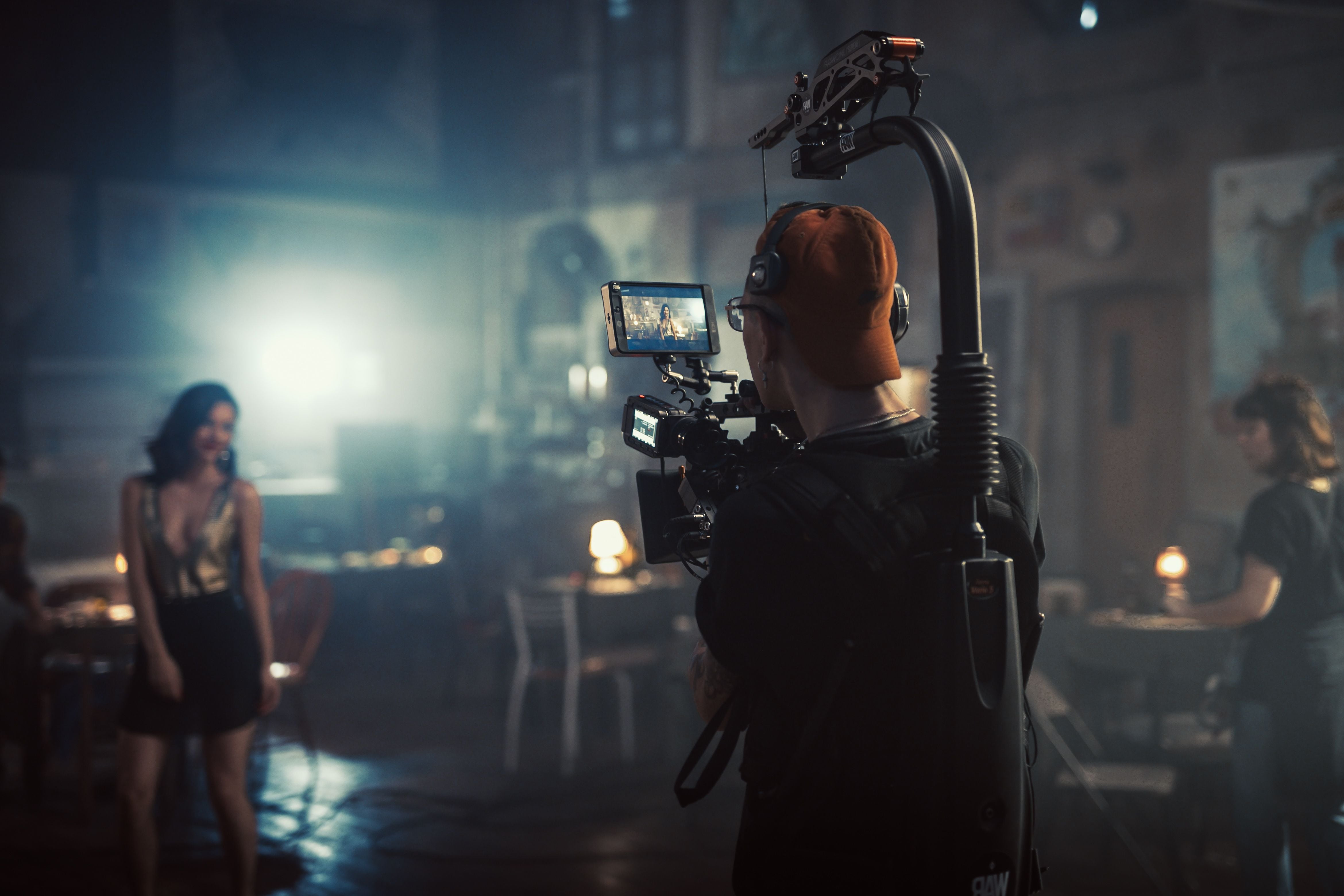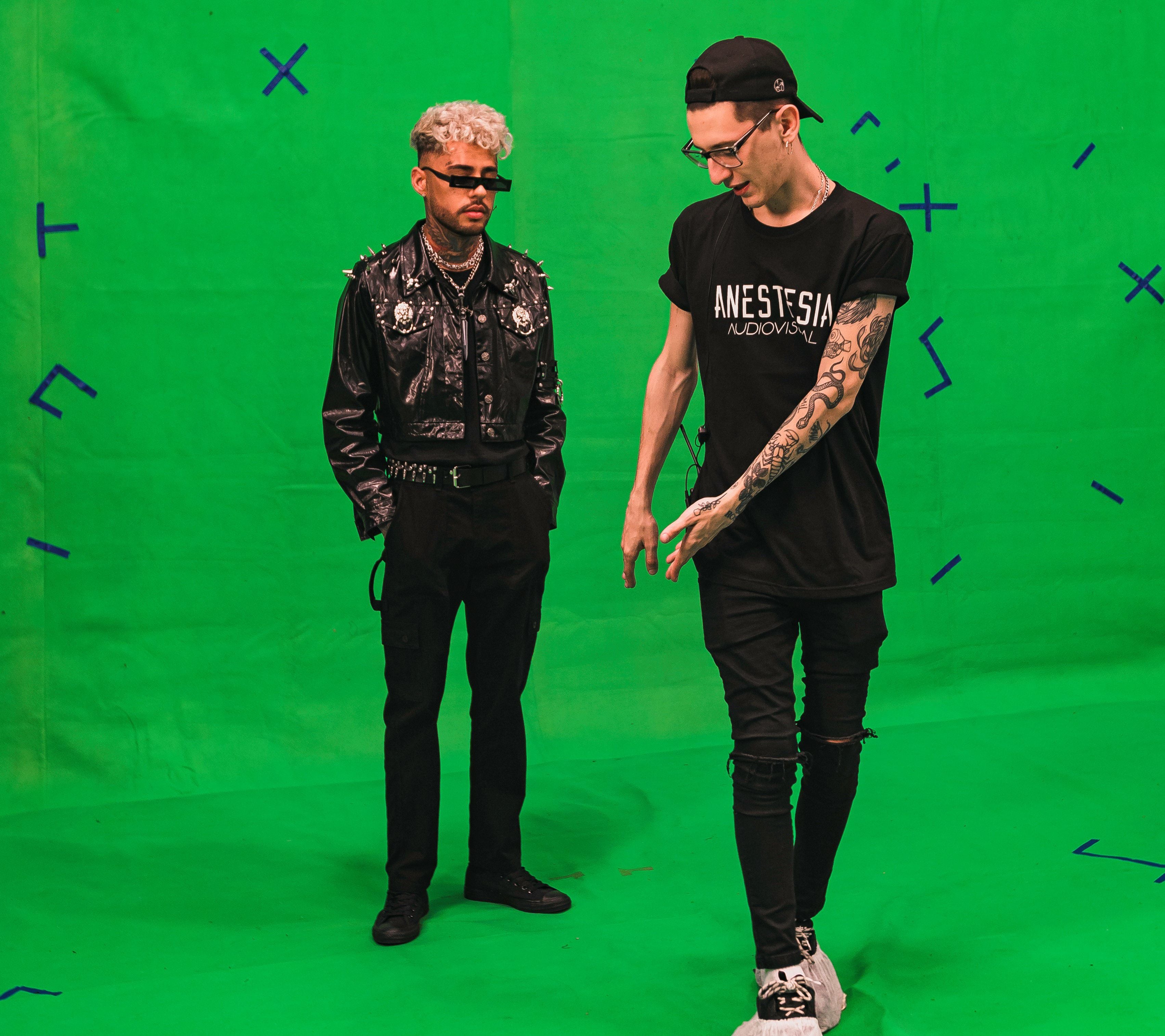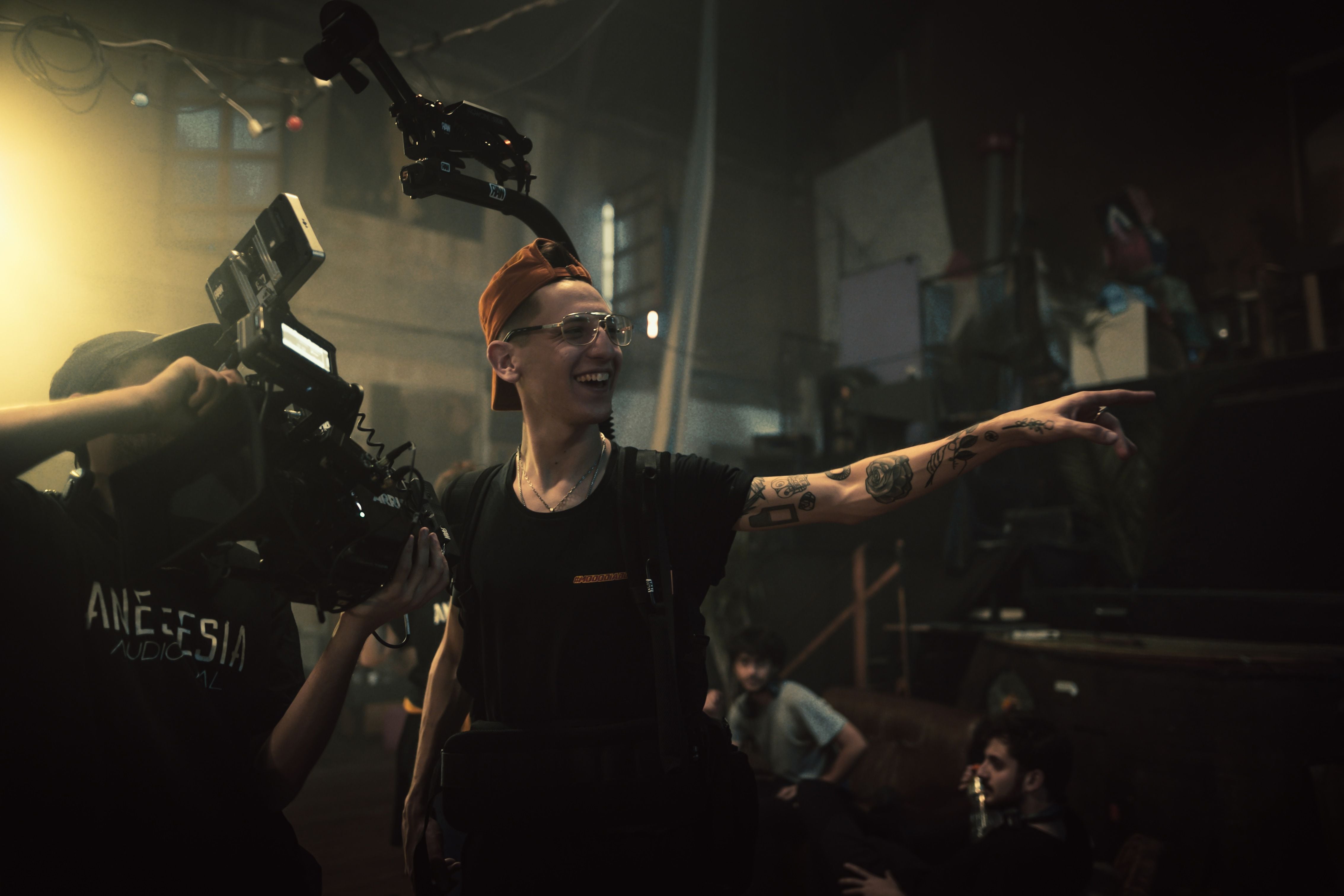There is something in music that makes us feel in a different place or time. Not only the lyrics, but the artist's voice, the sounds, the background beats and the context make each song a journey. This journey is both auditory and visual, with the great productions in the video clips, which in just a few minutes tell us a story and accompany it with images and scenes to match. In recent years, with the urban genre boom in Argentina, the bar has been rising and week after week new audiovisual pieces by different artists have been published, many of which are directed by Facundo Ballve, one of the most renowned music video directors in the entire region.
He worked alongside dozens of artists on several of the most listened to songs in today's most successful music videos, such as Duki, KHEA, Cazzu, Nicki Nicole, Tiago, YSY, Trueno, C.R.O and many more. Together with his two brothers he founded the production company Anestesia Audiovisual and week by week they add projects and new works.
Facu is 25 years old and hails from Pilar (Buenos Aires), where he grew up and spent his adolescence. Since childhood, he has been fascinated by cinema and photography, and his first job in that area was with the father of a friend, who was also a photographer. “I took a lot of pictures as a boy. At parties of 15 I took pictures when I was 15 “, remember. In parallel he became a fan of the rap scene, but only as a listener, and little by little began to unite both worlds. “I didn't rap. I just liked it. The only way was through the cinema. I started studying film without thinking that I was going to make video clips of what I do. At that time the music here didn't go anywhere. Everything was very undergound, very little mainstream. I was marginalized, it was impossible to think that I could dedicate myself to making trap videos,” he told Infobae Latin Power.
When he finished high school, he began studying at the Universidad de Cine and entered a photography studio for social events, and with practice he polished his work. At that time, a director who inspired him was Chino Jones, who gave a spin to the rap videos of the time: “He was the one who started to give a more pro look to the videos of rappers here. And I remember that I was in college and I watched his videos and thought 'this is useful to me, I'm here to do this'.

— And how did you get the chance to make the first video?
“One return a friend who raps called me and said: “I have a little song, do you want to make the video for me?” I made the video for him and they started calling me for one more and one more and one more. At the same time I started working with Leandro Dome who makes press on Doble HH radio, which is a hip-hop radio station in Argentina, and is the person who knows the most about rap in the country. I became a photographer in all the events. I did everything. A million events and that's what I started getting into. Suddenly I was taking pictures on the Fifth Step, YSY started asking me for videos. Then came Ecko and everyone.
Now each Facu Ballve video has a script and a great production behind it, but not everything was like that in the beginning, but it evolved along with the genre: “It was always putting the artist and rapping. I started writing videos two years ago or a little less. There was a time when it was impossible because I shot three videos a week. Not only did he not have time to script them, but it was going to solve. In the maelstrom it was impossible. Two years ago my brothers Tute and Nico started working with me and they solved everything. We started working much larger videos in smaller numbers, which later became the same amount.”
— What is the process like from when the proposal arrives until the day of the recording?
“At first, everything was more ruined. Duko speaks to me about a subject, we don't talk about budget, we filmed, then we saw how much came out, there is no signed contract. But at one point the boys start sticking, my brothers come in... All full legal contract, record label, and I started to derive that the managers of the artists talk to my brothers. Nowadays, the genre already has a school that is Duki, YSY, Modo Diablo, Cazzu, Khea. Today the second litter is Tiago, Nicki Nicole, Thunder, Maria Becerra, Rusherking. The newer ones already come with a team, which had previously been armed along the way, so it was very difficult to get Duki to stop talking to me and talk to my brother because we always work in one way. With the older school it continues to happen with them. Duko sure talks to me. Cazzu the same thing. More than now my brothers talk to the boys. They let us know that there is a video, we give the ok, we see dates, I start to put together the idea, that's when I talk to the artist, I ask him if he has any ideas, because in general they imagine something. I start there and we start thinking. Today we have the creative part very oiled. We put together an idea knowing how long it would last and how long it will come out. I pass it on to the artist, we close it, it is budgeted and with the ok the production starts. You get the locations, the people, who are usually freelancers and the technical team.
—In addition to pre-production and directing, do you also edit?
“I usually do the editing. Now that we have a lot of things I send it to publishers. But there is a whole part of the editing that I can't delegate, which is the thing before and after I put together the video. When I finish a video, there is a synchronization part of the ame trial before editing it. It is edited and when you finish editing it there is a part called shaping and finishing, which is to organize all the edited material, line it with the original material, because it is edited with the material in low quality. You have to reline high, make color and the entire final part of the video is always done by me. There are editors who edit with other programs and I have to spend eight hours doing the synchronization again. I've done it so many times that I do it fast. Now I'm editing less.

—I always think that video clips are like mini movies, because they manage to tell you a story, get excited or make you feel something in a few minutes. And the production and the audiovisual level also accompany. And before, if you wanted to direct something massive, it had to be a film or an advertisement, and now there is another arrival...
- Yes or yes you have to grow and evolve, and we start making them more movies. At one point we got tired of the artist singing alone on camera, we had to make it more film. That's good. It's very different from making a film because you depend on a song and a rhythm that's already set and you have to adapt to that. But I would love to make films in the future, my idea would be to make films or series.
- Did the opportunity come to you?
“I had a lot of talks for documentaries, I've been called a lot of times to make the trap story and none of them ended up doing it. I have a lot of footage from the story, and I have in my head what I saw. I know the timeline perfectly. I would love it even though it was never achieved. I would also love a movie, and today it is closely related, to the limitations of the video clip. The publication itself became a video clip. The audiovisual was always cinema or advertising, the video clip is something new. It started to become more massive recently.
During the last week there was a lot of talk on the scene about the filmmakers' work due to Coscu's reaction to the music video for the song Pa Co, by KHEA, LIT Killah and Rusherking. The streamer gave his opinion of it as he usually does after each release and highlighted some continuity errors in some shots. Later, director Agustín Portela came out to answer him and treated him as ignorant “artistically speaking” on Twitter.
— What do you think of the reactions of big streamers or youtubers to video clips and the reviews, good or bad, that they can make?
—The fact that Coscu makes a reaction and that people are influenced by him, with him or through him has nothing to do with us who make video clips or people who make music. I think they don't have to be reserved from saying things. If he's reacting, he has to say what he thinks. Your opinion is valuable because it is someone's opinion. At least I get a lot of feedback. Before sending the first version of a video to an artist, I send it to 10 people to watch it. And today my goal is the people who consume it. If I don't give a ball to those people I'm lost, then I give a lot of importance to the opinion of the one who doesn't know, for me it's the one who matters most. The one who knows is going to tell you things that those who don't know, which are 99% of the people are not going to notice, and I respect everything that Coscu or anyone who reacts will have to say. If they say that the video is a dick, it's good that they say why and I'm going to grab all that and in the next video I'm going to try not to do it. You have to target the audience that consumes it, and - whether you want it or not - it is the audience that Coscu, the streamers and reactors have. You don't have to worry so much and take it in favor and try to make progress based on that.
“And in the specific case of Agus, what do you think?
“In the case of the other day, I understood Agus that he is the director because Coscu talked a lot about that video and said a lot of specific things and it's a jerk because we who make videos know the work he takes and how hard he did that day. There are millions of variables and options. Things always go out on a budget basis. It's always a limitation. We have to put the day in a few hours, we have to put ten shots, we have to run, you don't have time to check the plans... I understand Agus and Coscu as well.

—We see the finished video clip which is four or five minutes. But how much is there about what you don't see at work?
— 99% of the things that happen behind a final video people don't know them and there are many things that are very stressful and very decisive in the project. If the artist arrived an hour late or was with a sore throat and had to relax a touch, or the camera didn't work on him because we are in Argentina and there is little budget and it often comes down, or whatever... You screwed up the shoot. Because you have 12 hours. It's the standard shooting time. You don't have enough money to do it with more hours.
— What big project do you remember that you had such limitations?
—For example Among Us Remix. It came out in January and it was a big project because it is the remix of Entre Nosotros which was the song of the year, because there were María Becerra and Nicki Nicole, who was the pinera time they were together, because it was a big budget and because in that case LIT and Nicki filmed one day and María and Tiago they filmed another one. That makes the budget we had shrink by half because it's two days. And that implies that basic expenses are doubled and you have to get the money that you had to dedicate to something else. In that video I spent 15 days at my house with the windows covered because I don't have blackout and to make color I need darkness. I've been locked up all Christmas and New Year's Eve editing and nobody found out about that. And on top of that with today's maelstrom five days later another topic came out and that's it... That makes the opinion of people in your video weigh you a little less, because next week you're making another one by the same artist. Beyond the fact that we take care of and give life in each video, if it is a little less good than the other, I know that next week I will have another chance with that artist, then there is a very fast workflow and that affects the result.
“You don't have much rest because you finish one and start another...
—There is something very flashing in this world and that is that for a “normal” person, say, who makes videos, a video clip project is something very big and something that you spend a lot of time on and get into the project a lot. We who make so many videos is different. Imagine we made a video of Cazzu, the last one that came out called Ballad for an Alien. She was next to an alien, she played the piano and that project was about getting so much into the production of a time band... you immerse yourself a lot in each project that is a world every video. Suddenly it comes out and the next day it's done. And we're making another one, possibly from Cazzu as well.
—Thanks to the internet, there are now many young people who begin their career as filmmakers learning in a self-taught way, without going to a university or a high school. Do you think it's a new way to gain knowledge?
“It's over there. I did that. Then I took photography courses and started studying film direction. In film direction I did a year, and then I did some subjects. In the theoretical part I didn't learn much. History of cinema? The benefit that I got from the faculty is to meet people and go to filming. It's just learning to do. Grab tutorials and learn how to edit. I edit from a very young age. There are many tools on the internet, you need you, your desire and do. The important thing about what we do is a lot of experience and practice. I spent filming to learn what I know. Nobody taught me. I feel like it's the way. I'm all for that and it's good that it happens.
KEEP READING:
Últimas Noticias
Debanhi Escobar: they secured the motel where she was found lifeless in a cistern
Members of the Specialized Prosecutor's Office in Nuevo León secured the Nueva Castilla Motel as part of the investigations into the case

The oldest person in the world died at the age of 119
Kane Tanaka lived in Japan. She was born six months earlier than George Orwell, the same year that the Wright brothers first flew, and Marie Curie became the first woman to win a Nobel Prize

Macabre find in CDMX: they left a body bagged and tied in a taxi
The body was left in the back seats of the car. It was covered with black bags and tied with industrial tape
The eagles of America will face Manchester City in a duel of legends. Here are the details
The top Mexican football champion will play a match with Pep Guardiola's squad in the Lone Star Cup

Why is it good to bring dogs out to know the world when they are puppies
A so-called protection against the spread of diseases threatens the integral development of dogs




